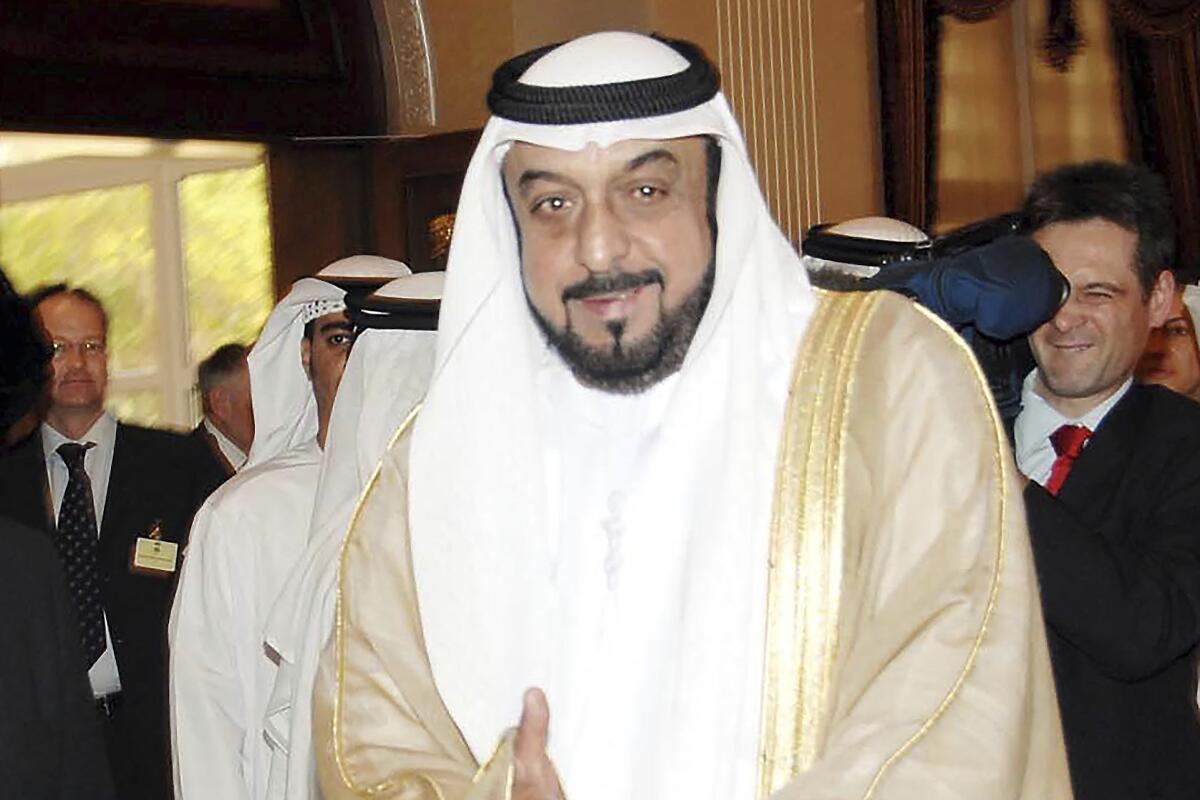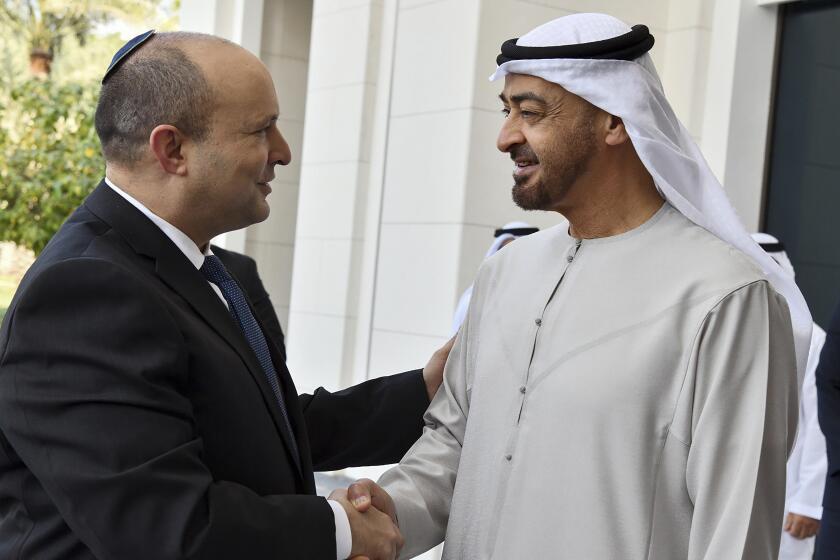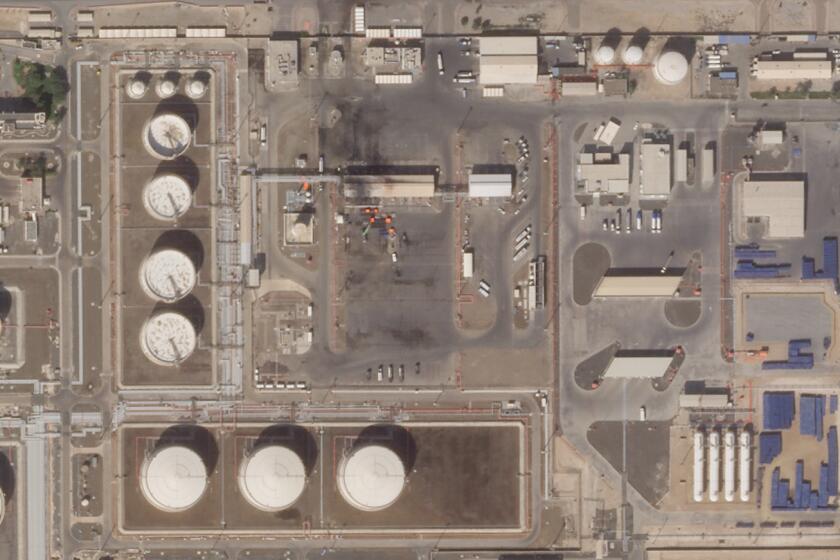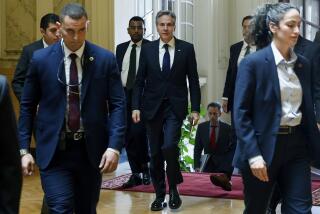Harris leads high-level delegation to UAE to pay respects to late leader, meet new one

- Share via
ABU DHABI, United Arab Emirates — A high-powered U.S. delegation led by Vice President Kamala Harris flew to the United Arab Emirates on Monday to pay respects to the federation’s late ruler and meet the newly ascended president.
The trip is the highest-level visit by Biden administration officials to oil-rich Abu Dhabi, intended to be a potent show of support as Washington tries to repair their troubled relations.
The delegation includes Secretary of State Antony J. Blinken, Defense Secretary Lloyd J. Austin III, CIA Director William Burns and climate envoy John Kerry, among others.
The UAE named the assertive Abu Dhabi crown prince, Sheikh Mohammed bin Zayed Al Nahyan, its new president following the death of his half-brother Sheikh Khalifa bin Zayed Al Nahyan on Friday. Sheikh Mohammed has served as the country’s de facto ruler and shaped the country’s muscular foreign policy since Sheikh Khalifa suffered a stroke nearly a decade ago.
Under Sheikh Mohammed’s de facto rule, the UAE has intervened in regional conflicts from Yemen to Libya, used its vast oil wealth to exert influence abroad and transformed itself into a regional financial hub.
Underscoring Abu Dhabi’s sway in Western and Arab capitals, an array of presidents and prime ministers descended on the desert sheikhdom over the weekend to honor the late Sheikh Khalifa, praise Sheikh Mohammed and solidify ties. French President Emmanuel Macron and British Prime Minister Boris Johnson were the first European leaders to jet to the UAE capital.
Israel and the United Arab Emirates established official relations last year, paving the way for Israeli leader Naftali Bennett’s visit to Abu Dhabi.
More dignitaries were expected to filter through the Abu Dhabi airport’s marbled presidential terminal Monday. Tehran said Iranian Foreign Minister Hossein Amirabdollahian would head to the emirate — a meeting that could coincide with the U.S. visit led by Harris. Iran has refused to meet American officials face-to-face, even as they negotiate a return to Tehran’s tattered nuclear accord with world powers.
Before heading to Abu Dhabi, Harris said she was traveling on behalf of President Biden to offer condolences on the death of the long-ailing Sheikh Khalifa and to shore up America’s crucial relationship with the UAE.
“The United States takes quite seriously the strength of our relationship and partnership with the UAE,” Harris told reporters. “We are going there then to express our condolences but also as an expression of our commitment to the strength of that relationship.”
It was widely expected that officials would address the UAE’s long-simmering frustrations about U.S. security protection in the region as well as tensions that have emerged between the countries over Russia’s war on Ukraine.
Videos on social media show the sky over Abu Dhabi lighting up before dawn with what appear to be interceptor missiles racing into the clouds.
The UAE, along with Saudi Arabia, has faced American pressure to shun Russia and pump more oil to improve stability in energy markets as Europe tries to wean itself off Russian crude.
But the UAE is a key Russian trading partner and member of the so-called OPEC Plus agreement, of which Russia is an important member. The Emiratis have rebuffed American demands — resistance rooted in an apparent feeling that, despite its continued strong military presence across the Arabian Peninsula, the U.S. is no longer such a reliable partner.
After taking office, Biden lifted a terrorist designation on Yemen’s Iran-backed Houthi rebels, who have fired missiles and drones at the UAE and Saudi Arabia, and is trying to revive Tehran’s nuclear deal — an accord that Gulf Arab states fear could embolden Iran and its proxies.
The U.S.’s abrupt and chaotic withdrawal from Afghanistan last summer and its long-term foreign policy goal of pivoting away from the Mideast toward China has added to Gulf Arab concerns. Meanwhile, the Biden administration has suspended a multi-billion-dollar sale of F-35 fighter jets to the UAE agreed on by former President Trump.
Trump abandoned Tehran’s nuclear deal and heavily courted Emirati and Saudi officials.
This spring, Yousef al-Otaiba, the UAE’s ambassador to the U.S., described the allies as going through a “stress test.”












